You are viewing the Cultures of Knowledge Blog archive for the ‘Lectures’ Category:
Kim McLean-Fiander
May 13, 2012
Events, Lectures, Podcasts, Project Updates, Projects and Centres, Websites and Databases
Tags: Archives, Bess of Hardwick, Digitization, Editions, England, Gender, Materiality, Sixteenth Century, Women
 Podcast available on the seminar page!
Podcast available on the seminar page!
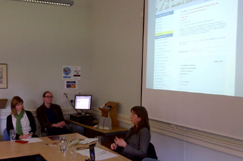
Alison fields questions.
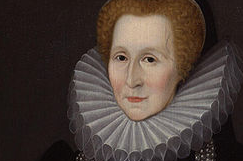
Bess in the 1590s.
Dr Alison Wiggins of the University of Glasgow got our third seminar series off to a brilliant start on 26 April with a sophisticated and thought-provoking presentation on Editing Bess of Hardwick’s Letters Online. As Principal Investigator of the Letters of Bess Hardwick Project (funded by the AHRC), Alison described the benefits and methodological challenges of digitizing this unique Renaissance correspondence, which consists of approximately 245 extant letters (160 to and 85 from Bess) scattered across 18 different repositories spanning a period of nearly 60 years.
Using several examples drawn from the corpus, Alison argued that making all of the letters available in an open-access, fully searchable online edition will enable scholars to pursue a wide range of linguistic, sociological, and historical questions, and will allow them to arrive at a much more comprehensive and nuanced understanding of the character of Bess herself, who has been variously depicted as a materialistic virago or as an admirable defender of women’s honour.
 Moving on to more methodological questions, Alison explained that capturing and communicating significant information on the material and visual features of letters, such as the writer’s use of ‘significant space’, paper quality and size, the employment of colourful silk ribbons and flosses, seal choice, and the many varieties of folding, can be particularly difficult in a digital environment, which has a tendency to reify disembodied text at the expense of the letter-object (concerns also raised by Henry Woudhuysen and James Daybell in previous talks). This is a significant problem, since such information is not just antiquarian micro-detail; on the contrary, for contemporary recipients, all of these carefully considered material decisions on the part of the sender conveyed specific social meanings about politeness, deference, and hierarchy which set important parameters for the reception and consumption of a letter’s written content. However, such physical variables and their nuances are not easy to capture faithfully with a simple measurement or colour chart reference in a metadata field. The solutions developed by Alison and her team in the context of the Bess project (such as encoding each of the four recognized kinds of letter-fold − tuck and fold, slit and band, accordion, and sewn − within each letter’s XML to facilitate searching and filtering by plicature and packet type) genuinely move forward thinking in this oft-neglected area and will be of great interest to other digital initiatives.
Moving on to more methodological questions, Alison explained that capturing and communicating significant information on the material and visual features of letters, such as the writer’s use of ‘significant space’, paper quality and size, the employment of colourful silk ribbons and flosses, seal choice, and the many varieties of folding, can be particularly difficult in a digital environment, which has a tendency to reify disembodied text at the expense of the letter-object (concerns also raised by Henry Woudhuysen and James Daybell in previous talks). This is a significant problem, since such information is not just antiquarian micro-detail; on the contrary, for contemporary recipients, all of these carefully considered material decisions on the part of the sender conveyed specific social meanings about politeness, deference, and hierarchy which set important parameters for the reception and consumption of a letter’s written content. However, such physical variables and their nuances are not easy to capture faithfully with a simple measurement or colour chart reference in a metadata field. The solutions developed by Alison and her team in the context of the Bess project (such as encoding each of the four recognized kinds of letter-fold − tuck and fold, slit and band, accordion, and sewn − within each letter’s XML to facilitate searching and filtering by plicature and packet type) genuinely move forward thinking in this oft-neglected area and will be of great interest to other digital initiatives.
Following a brief, appetite-whetting demonstration of the Bess letters alpha software, a lively question and answer session concluded the seminar, which covered such topics as the sociolinguistic significance of employing scribes and the iconographic implications of Bess using her ‘ES’ signature both in letters and as architectural embellishment on her stately home, Hardwick Hall. Broader concerns were also addressed, including the need for digital projects to produce REF-friendly outputs – an increasingly important theme – and ways of ensuring the preservation and accessibility of online resources long after project funding comes to an end. The soon-to-be-released Bess of Hardwick Letters Online will include annotated transcriptions of all of the letters and images of many, as well as articles and podcasts offering further contextual analyses of the correspondence. For news about its release date, stay tuned!
Seminars take place in the Faculty of History on George Street on Thursdays at 3pm. For future talks in the series – and to listen to the podcast of Alison’s paper – please see the seminar webpage. All are welcome!
James Brown
March 29, 2012
Events, Lectures, Project Updates
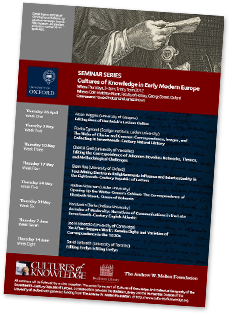 We are delighted to share the programme for the third and final Project seminar series. Entitled Cultures of Knowledge in Early Modern Europe, and this year convened by Howard Hotson (following sterling work by Pietro Corsi and Peter Harrison on the 2010 and 2011 cycle), the series assembles yet another glittering cast of eight authorities on early modern letters and correspondence. As ever, our speakers will range widely over the topic, providing status updates on world-renowned editions, rich historical case studies, state-of-the-art digital approaches, and theoretical reflections that encourage us to think differently about early modern epistolarity. Podcasts and write-ups from the 2010 and 2011 series will give you a flavour of the talks; for exciting discussion, slides, and an opportunity to engage with speakers informally over wine and nibbles following their papers, you are welcome to join us.
We are delighted to share the programme for the third and final Project seminar series. Entitled Cultures of Knowledge in Early Modern Europe, and this year convened by Howard Hotson (following sterling work by Pietro Corsi and Peter Harrison on the 2010 and 2011 cycle), the series assembles yet another glittering cast of eight authorities on early modern letters and correspondence. As ever, our speakers will range widely over the topic, providing status updates on world-renowned editions, rich historical case studies, state-of-the-art digital approaches, and theoretical reflections that encourage us to think differently about early modern epistolarity. Podcasts and write-ups from the 2010 and 2011 series will give you a flavour of the talks; for exciting discussion, slides, and an opportunity to engage with speakers informally over wine and nibbles following their papers, you are welcome to join us.
Seminars take place in Trinity Term 2012 on Thursdays at 3-5pm in the Faculty of History‘s light and airy Colin Matthew Room. For the full programme and further details, please see the seminar webpage. The seminar poster (pdf) can be downloaded on the right.
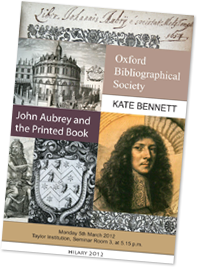 Our very own Kate Bennett will deliver an Oxford Bibliographical Society lecture on John Aubrey and the Printed Book at the Taylor Institution on Monday 5 March at 5.15pm. John Aubrey is not known primarily for his publications, but for his manuscripts, including his letters, which the Project is editing for publication and calendaring within Early Modern Letters Online. This is often construed negatively, as a failure to print. In her lecture, Kate will reconstruct and explore Aubrey’s complex relationship with printed texts, through his library (full of annotated books), his relations with publishers, his interest in bibliography and the history of the book, and through the libraries of others which he consulted. She will also examine his relationship with the books of those with whom he collaborated, including Anthony Wood and Robert Plot. She will consider how Aubrey balanced print and manuscript as a way of avoiding the risks involved in printing modern histories and lives; and, ultimately what the printed book meant to him. All are welcome!
Our very own Kate Bennett will deliver an Oxford Bibliographical Society lecture on John Aubrey and the Printed Book at the Taylor Institution on Monday 5 March at 5.15pm. John Aubrey is not known primarily for his publications, but for his manuscripts, including his letters, which the Project is editing for publication and calendaring within Early Modern Letters Online. This is often construed negatively, as a failure to print. In her lecture, Kate will reconstruct and explore Aubrey’s complex relationship with printed texts, through his library (full of annotated books), his relations with publishers, his interest in bibliography and the history of the book, and through the libraries of others which he consulted. She will also examine his relationship with the books of those with whom he collaborated, including Anthony Wood and Robert Plot. She will consider how Aubrey balanced print and manuscript as a way of avoiding the risks involved in printing modern histories and lives; and, ultimately what the printed book meant to him. All are welcome!
 Podcasts of most of the papers in our 2010 and 2011 seminar series, ‘Cultures of Knowledge in Early Modern Europe’, are now available for playing and download on the Project website. The international cast is glittering and the range of correspondence-related topics broad, so please do fire up your speakers and mobile devices. To hear last year’s papers, see the 2010 seminar page; to hear this year’s papers, see the 2011 seminar page. Happy listening!
Podcasts of most of the papers in our 2010 and 2011 seminar series, ‘Cultures of Knowledge in Early Modern Europe’, are now available for playing and download on the Project website. The international cast is glittering and the range of correspondence-related topics broad, so please do fire up your speakers and mobile devices. To hear last year’s papers, see the 2010 seminar page; to hear this year’s papers, see the 2011 seminar page. Happy listening!
James Brown
July 04, 2011
Events, Lectures, Project Updates
Tags: Astronomy, Europe, History of Science, John Wallis, Mathematics, Networks, Oxford, Royal Society, Seventeenth Century
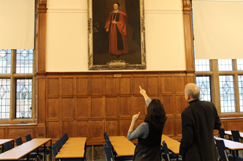
Kneller's 1699 portrait of Wallis in situ.
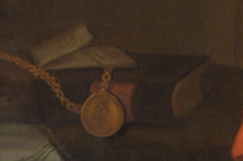
A telling epistolary detail.
In the eighth and final paper of our second seminar series on Thursday 23 June, our very own Dr Philip Beeley (University of Oxford) brought proceedings to a strong finish with a paper entitled ‘Oxford Science and the Republic of Letters: The Correspondence Networks of John Wallis’. Drawing on his intensive research on Wallis’s letters – two hard-copy editions of which he is preparing for publication with the support of the Project – Beeley argued that, in the absence of direct patronage, Wallis’s 246 individual correspondences enabled the mathematician, cryptographer, and (from 1649) Savilian Professor of Geometry to establish a name for himself within the broader European Republic of Letters. Indeed, the importance of epistolarity to Wallis is iconographically symbolised by the prominence of an opened letter in Kneller’s 1699 portrait of him (pictured), which now hangs in the University’s Examination Schools. Focussing on case studies, Philip used Wallis’s harmonious communications with the Danzig astronomer Johannes Hevelius to show how epistolary exchanges between distant friends could facilitate the kind of productive intellectual commerce and collaboration idealized by Comenius, Hartlib, and (in the context of the early Royal Society) Henry Oldenburg. However, switching his focus to Wallis’s more turbulent astronomical entanglements with the Dutch mathematicians Christiaan Huygens and Frans van Schooten, Beeley reminded us that the Republic of Letters was far from a gentleman’s club, and that interpersonal rivalries, methodological disuputes, accusations of plagiarism, and the quest for success and status remained powerful influences on scientific discussion throughout the second half of the seventeenth century. Questions focused on letters, mathematical pedagogy, and disciplinary formation; the importance of the patronage of Mary Vere during the first part of Wallis’s career; and unwritten codes of conduct and behaviour within the Republic of Letters. For past lectures in the series, please see the seminar webpage; details of the 2011 series will be available shortly.
 Podcast now available on the seminar page!
Podcast now available on the seminar page!
James Brown
June 26, 2011
Events, Lectures, Project Updates
Tags: Databases, Eighteenth Century, Hans Sloane, History of Medicine, History of Science, Networks, Seventeenth Century, Visualization
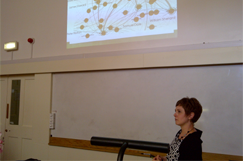
Dr Smith during her talk.
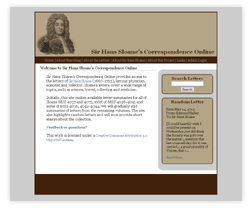
For the seventh and penultimate paper of our seminar series on Thursday 16 June, Dr Lisa Smith (University of Saskatchewan) described her recent efforts towards ‘Visualizing Hans Sloane’s Early Correspondence Networks’. Despite neglect in the historiographies of medicine and science, Smith described Sloane as a facilitator or ‘supermediator’ central to the activities of the early Royal Society as well as the lives of his patients, who corresponded voluminously despite his small number of formal publications. Indeed, Smith is in the process constructing a relational database of Sloane’s many letters – Sir Hans Sloane’s Correspondence Online – which she demonstrated during the talk, and which provided the raw data for the network visualizations. Emphasising that the resource is a work in progress (although an impressive 1,641 letters have been catalogued so far), Smith described the ‘back’ and ‘front’ ends of the catalogue – like our own digital resource, a sophisticated editorial interface sits beneath the search and browse functions – which allows users to explore and filter the Sloane corpus by a full range of standard epistolary metadata as well as a variety of medical themes and keywords, both contemporary and modern. Transcriptions are also being made available, while digital images of the original manuscripts are also in the pipeline. In the second half of her talk, Smith used visualizations of the data created with the recent Yifan Fu algorithm to explore several of the most interesting networks revealed by the correspondence; a surprisingly continental set of relationships, in which connections of patronage, marriage, and friendship loom large. Smith concluded by arguing that network visualizations derived from large datasets are vital in revealing intricacies and overlaps between groups of individuals which would not otherwise have been perceivable, and are of special value in highlighting clusters of relationships (or networks within networks) which can then be reconstructed in more detail. Seminars take place in the Faculty of History on George Street on Thursdays at 3pm. For future talks in the series, please see the seminar webpage.
 Podcast now available on the seminar page!
Podcast now available on the seminar page!
Podcast available on the seminar page!


 Moving on to more methodological questions, Alison explained that capturing and communicating significant information on the material and visual features of letters, such as the writer’s use of ‘significant space’, paper quality and size, the employment of colourful silk ribbons and flosses, seal choice, and the many varieties of folding, can be particularly difficult in a digital environment, which has a tendency to reify disembodied text at the expense of the letter-object (concerns also raised by Henry Woudhuysen and James Daybell in previous talks). This is a significant problem, since such information is not just antiquarian micro-detail; on the contrary, for contemporary recipients, all of these carefully considered material decisions on the part of the sender conveyed specific social meanings about politeness, deference, and hierarchy which set important parameters for the reception and consumption of a letter’s written content. However, such physical variables and their nuances are not easy to capture faithfully with a simple measurement or colour chart reference in a metadata field. The solutions developed by Alison and her team in the context of the Bess project (such as encoding each of the four recognized kinds of letter-fold − tuck and fold, slit and band, accordion, and sewn − within each letter’s XML to facilitate searching and filtering by plicature and packet type) genuinely move forward thinking in this oft-neglected area and will be of great interest to other digital initiatives.
Moving on to more methodological questions, Alison explained that capturing and communicating significant information on the material and visual features of letters, such as the writer’s use of ‘significant space’, paper quality and size, the employment of colourful silk ribbons and flosses, seal choice, and the many varieties of folding, can be particularly difficult in a digital environment, which has a tendency to reify disembodied text at the expense of the letter-object (concerns also raised by Henry Woudhuysen and James Daybell in previous talks). This is a significant problem, since such information is not just antiquarian micro-detail; on the contrary, for contemporary recipients, all of these carefully considered material decisions on the part of the sender conveyed specific social meanings about politeness, deference, and hierarchy which set important parameters for the reception and consumption of a letter’s written content. However, such physical variables and their nuances are not easy to capture faithfully with a simple measurement or colour chart reference in a metadata field. The solutions developed by Alison and her team in the context of the Bess project (such as encoding each of the four recognized kinds of letter-fold − tuck and fold, slit and band, accordion, and sewn − within each letter’s XML to facilitate searching and filtering by plicature and packet type) genuinely move forward thinking in this oft-neglected area and will be of great interest to other digital initiatives.

 Our very own
Our very own  Podcasts of most of the papers in our 2010 and 2011 seminar series, ‘Cultures of Knowledge in Early Modern Europe’, are now available for playing and download on the Project website. The international cast is glittering and the range of correspondence-related topics broad, so please do fire up your speakers and mobile devices. To hear last year’s papers, see the
Podcasts of most of the papers in our 2010 and 2011 seminar series, ‘Cultures of Knowledge in Early Modern Europe’, are now available for playing and download on the Project website. The international cast is glittering and the range of correspondence-related topics broad, so please do fire up your speakers and mobile devices. To hear last year’s papers, see the 




 Join
Join 